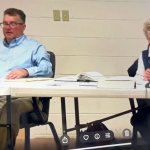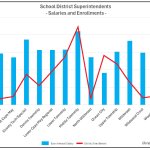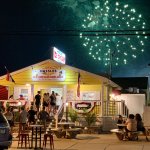Video and Photos of Thursday, July 16 Council meeting by: Harry B. Scheeler, Jr.
WOODBINE— Concerned residents of Carol Lynn Resorts who are being forced to move from their homes on Nov. 1, of this year came to the Borough Council meeting on Thursday, July 17, to confront owner Anthony “Smokey” Saduk, who is also a council member. Residents say Saduk had been ignoring their request for a meeting so they could investigate what prompted the resort owner to order them out of their homes in four months.
The biweekly council meeting that typically attracts only a handful of borough residents quickly filled to standing room only with a uniformed security officer standing next to the council members.
The meeting opened with routine business for the first 20 minutes then moved into public comment. Before anyone asked any questions Saduk opened by stating “Before we have the public comment session I must address the public that sitting here as a council member I have to abstain from all questioning or answer any questioning you may have due to.” Saduk was then interrupted by moans and groans before one man standing in the rear of the room shouted “You defrauded us! Yeah you defrauded us that’s what you did I put all my money into your park because you told me I could stay there the rest of my life!”
Residents of the resort complained at the meeting about Carol Lynn Resorts advertising that said they were a year round camping resort. Many who are on fixed incomes found the resort to be an affordable housing option and said they would have never considered buying a home they could only occupy seasonally. They all spoke directly at Saduk while Saduk sat refusing to comment.
Thousands enjoy the approximately 50 campgrounds in Cape May County and whether they’re supposed to or not, some stay in their park trailers campers year round including many campers in Woodbine.
Park models are defined as trailer-type units that are primarily designed to provide temporary living quarters for recreational camping or seasonal use. They are generally 400 square feet or less and built on a single chassis mounted on wheels.
The big flap is over the state’s interpretation of Article 552.4 of the National Electric Code, which reads:
“General Requirements. A park trailer as specified in 552.2 is intended for seasonal use. It is not intended as a permanent dwelling unit or for commercial uses such as banks, clinics, offices, or similar.”
Since the word “seasonal” is not defined within the code, the state Department of Community Affairs (DCA) has decided it means half a year in New Jersey.
“For purposes of applying this requirement, the park in which the structure is located shall be open for six months or less each year or access to the structures shall be otherwise restricted to a period of six months or less each year,” states the new rules for recreational park trailers.
Why is the state implementing the new rules? They say it’s for the campers’ own good, even though there have been no reports of fires or other problems from over use of the park models.
“The proposed new rule would be expected to have a positive social impact,” the rule states. “It is important that the rules governing park model trailers are clear in order to protect the health and safety of the residents of these units.”
Some local residents likely disagree.
Given this six-month rule, ownership of Carol Lynn Resorts in Woodbine sent notices to its campers that it would be closing the park on Nov. 1, much to the chagrin of those who have made the park their home for many years.
“It’s unfortunate that the state has chosen to do this at this time. They’re making us look like the bad guys,” said Carol Saduk, who owns Carol Lynn along with her husband Anthony “Smokey” Saduk.
“Our position is that we have to follow the law,” she added. “Carol Lynn Resorts (the original park opened in 1979) has always been open all year. But every camper signs a lease, which states that the lease to their site ‘does not allow occupancy of any site as a permanent habitation’. In addition the lease states, ‘this lease permits occupancy of a site by a camper or his guest during any given year subject to the rules and regulations of the campground and any applicable federal, state and local laws, regulations and ordinances’.”
DCA standards for campground facility health and safety provide for annual inspections by the Bureau of Housing Inspection in the Division of Codes and Standards or an authorized local agency, which DCA spokesperson Lisa Ryan confirmed.
“The six-month seasonal usage is enforced at the local level by licensed code officials,” she told the Herald. She said the regulation has been in effect since August 2008.
“It is important to note that it is at the discretion of the owner of the campground facility or other facility as to how they wish to impose seasonal usage,” she added.
“The DCA has never directed that campgrounds be open for six consecutive months and then closed. Campground owners can develop measures in which park model residents can use these facilities during weekends throughout the year, so long as they are not using them a total of more than six months in the year.”
“The park model community has some concerns with the six month timeframe and the DCA has asked that they submit a reasonable alternative, which they have yet to do,” Ryan said. “We have expressed a desire to work with this community in order to come up with a solution that is both reasonable and ensures the public safety and we look forward to doing so.”
In fact, the camping community had offered a compromise, said Jay Otto, president of New Jersey Campground Owners Association.
The DCA rejected the association’s first suggestion of unlimited access from March 1 through Nov. 1 plus 20 days per month between Nov. 1 and March 1.
“Based on your suggestion, the units could be occupied for all but 40 days per year,” replied Cynthia A. Wilk, director of the DCA’s Division of Codes and Standards.
“While the National Electric Code does not define ‘seasonal,’ I think that it is reasonable to say that occupancy for all but 40 days in a calendar year, a little more than one month out of the year, would not be considered seasonal use.”
Chapter XIII of this borough’s municipal code regarding campground occupancy states that from Nov. 1 to April 1, the occupancy of any one campsite shall be restricted to a period not to exceed 21 days during any 30-day period.
This definition of “seasonal” did not come out of the blue, said Otto. It stems from a former chapter in the state Health Department’s Sanitary Code regarding campground occupancy.
The current code no longer contains the specific dates.
“Public campgrounds shall not be used for the public of domicile or residence unless otherwise permitted by municipal ordinance the code states. The public campground owner shall take such measures as are necessary to prevent the use of any camping unit within a campground for domicile or residence,” the code states. “Policies and procedures shall be established by the public campground owner to effectively implement the provisions of this chapter. Such policies and procedures shall be reflected in all lease agreements.”
“I think the state withdrew that language from the code after they realized they were forcing the closure of a business for part of the year,” Otto said.
Otto said the six-month rule was “really restrictive and arbitrary” and that New Jersey is the only state in the country to use the electrical code as a basis for setting campground occupancy rules. He said his organization had battled with the DCA before over construction issues.
Otto said that his organization does not condone the use of park models for year round use, but he doesn’t believe that there’s any actual safety issues with the trailers. He said the newer models are wired just like homes.
“There’s nothing wrong with the electric systems. People have been camping in these park models for over 20 years and there has never been a problem,” he said. “This is just the DCA flexing its muscles.”
Al Ripa, a Carol Lynn Resort resident and a Belleplain Rescue Squad emergency medical technician, told freeholders at a July 14 meeting that there had been only two fires in the campground in 30 years, neither serious.
“Why, all of a sudden are we being kicked out on the street?” Ripa asked.
“The seniors have no place to go. We were notified that they are throwing us on the streets,” he added.
State Sen. Jeff Van Drew (D-1st) told the Herald he thinks the DCA was “overreaching” with its new six-month rule. He agreed that the trailers were not spontaneously bursting into flames when used all year.
“Clearly, however, everyone agrees that the park models are not made for year round use,” he said. “But I think the DCA has gone too far the other way with this regulation.”
He said the climate in the southern part of the state allows for outdoor activities well into the winter months.
Van Drew sounded hopeful, however, that the campground association and the DCA would come to an agreement soon.
Otto said the association would next submit a suggestion for a seasonal definition of 250 days.
Whatever the final outcome is, park model owners in one local campground are likely hoping not to lose their homes in a few months.
Contact Hart at (609) 886-8600 Ext 35 or at: jhart@cmcherald.com








